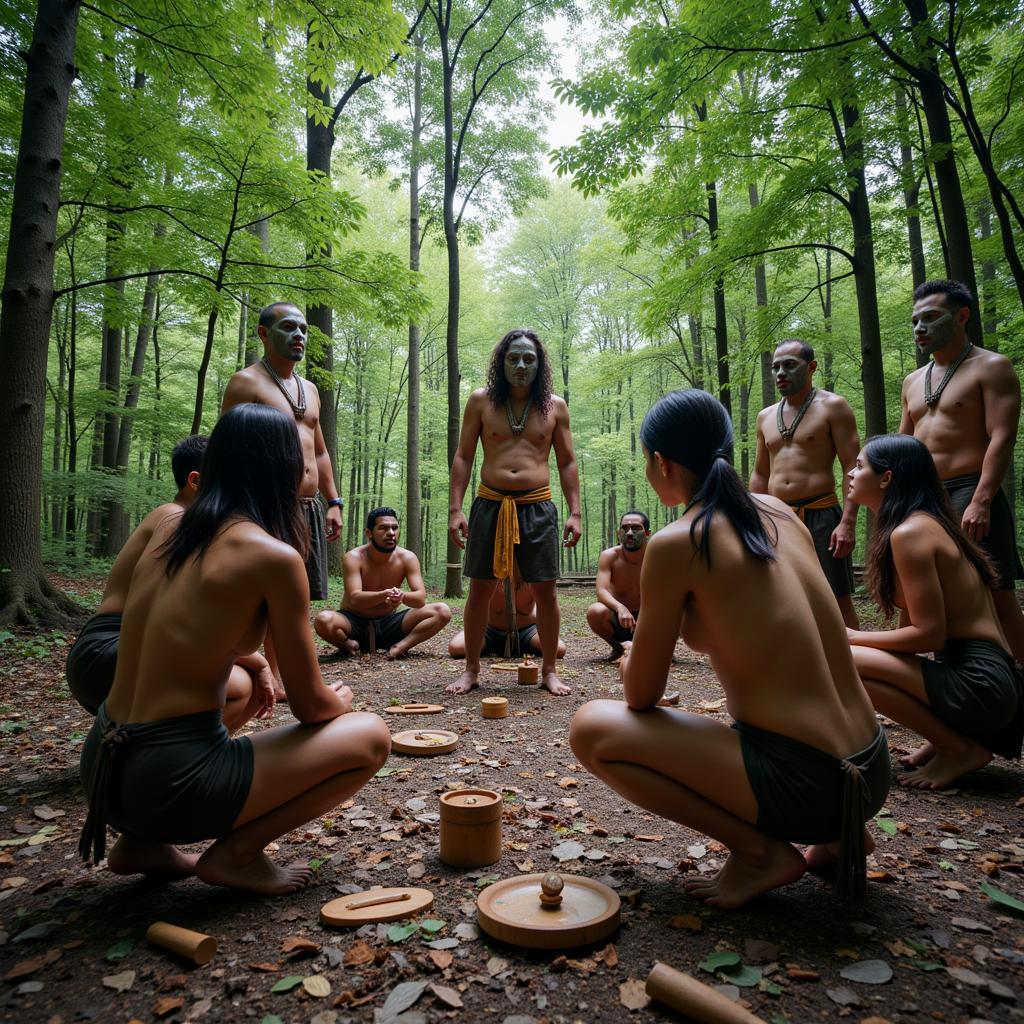African Secret Societies have long captivated the world with an aura of mystery and intrigue. These organizations, woven into the fabric of many African communities, play diverse roles, from maintaining social order and transmitting knowledge to wielding political influence and serving spiritual purposes. This exploration delves into the history, rituals, and influence of African secret societies, offering insights into their significance within the continent’s rich cultural tapestry.
The Hidden World of African Secret Societies
African secret societies, far from being monolithic, exhibit a remarkable diversity in their structure, purpose, and practices. Some societies focus on spiritual guidance and ancestor veneration, while others are deeply involved in political and economic affairs. black secret societies Membership can be based on lineage, age, gender, profession, or even personal achievement. Secrecy plays a crucial role, safeguarding sacred knowledge, rituals, and the power dynamics within the society.
Types and Purposes of African Secret Societies
African secret societies are categorized based on their primary functions, which can include:
- Initiation Rites: Many societies oversee rites of passage, marking transitions from childhood to adulthood, or into specialized roles within the community.
- Spiritual Guidance: Some societies act as custodians of spiritual traditions, connecting members to ancestral spirits and guiding them in matters of faith and morality.
- Social Control: Certain societies maintain social order by enforcing customary laws, resolving disputes, and ensuring adherence to community norms.
- Political Influence: Some powerful secret societies exert considerable political influence, shaping leadership selection, policy decisions, and even conflict resolution.
- Economic Cooperation: Some societies function as mutual aid organizations, providing members with financial assistance, access to resources, and opportunities for economic advancement.
 Initiation ceremony of an African secret society
Initiation ceremony of an African secret society
“Understanding the complexity of African secret societies requires acknowledging their diverse functions and the intricate interplay between spiritual beliefs, social structures, and political dynamics,” explains Dr. Fatima N’Goran, a renowned anthropologist specializing in West African cultures.
Rituals and Symbolism
Secrecy shrouds many of the rituals and symbols associated with African secret societies. Masks, costumes, dances, and music often play essential roles in ceremonies, serving as conduits to the spiritual realm and embodying the society’s values and beliefs. winyah indigo society The meanings of these symbols are often layered and complex, understood only by initiated members.
Dispelling Myths and Misconceptions
Western portrayals of African secret societies have often been sensationalized and distorted, perpetuating harmful stereotypes and misconceptions. It’s crucial to move beyond these simplistic narratives and appreciate the rich cultural context in which these societies operate.
The Role of Women in African Secret Societies
Contrary to popular belief, women play active and significant roles in many African secret societies. Some societies are exclusively female, while others have separate branches for men and women, each with its own distinct responsibilities and rituals. “Women’s involvement in secret societies often reflects their crucial roles within the larger community, encompassing spiritual leadership, economic power, and social influence,” notes Dr. Amadi Diop, a historian specializing in gender and power dynamics in African societies.
African Secret Societies in the Modern Era
Despite the challenges posed by modernization and globalization, many African secret societies continue to thrive, adapting to changing circumstances while preserving core traditions. They remain vital forces in shaping cultural identity, promoting social cohesion, and navigating the complexities of the contemporary world. “The enduring presence of secret societies in Africa testifies to their adaptability and continued relevance in addressing social, political, and spiritual needs within their communities,” observes Dr. Kwame Asante, a sociologist specializing in African social movements.
Conclusion: African Secret Societies – A Tapestry of Tradition and Transformation
African secret societies represent a rich and complex tapestry of tradition and transformation. Their influence permeates various aspects of African life, from spiritual beliefs and social structures to political dynamics and economic activities. Understanding these societies requires appreciating their diversity, recognizing their crucial roles within their communities, and challenging the misconceptions that often surround them. By fostering respect for diverse cultural expressions and promoting intercultural dialogue, we can gain deeper insights into the multifaceted world of African secret societies and their ongoing contributions to the continent’s vibrant cultural heritage.
FAQ
- Are all African secret societies the same?
- What are the common goals of these societies?
- How do secret societies contribute to African culture?
- Are secret societies still relevant in modern Africa?
- How can I learn more about specific African secret societies?
When you need support, please contact Phone Number: 02043854663, Email: [email protected] Or visit us at: Khu 34, Bac Giang, 260000, Vietnam. We have a 24/7 customer service team.